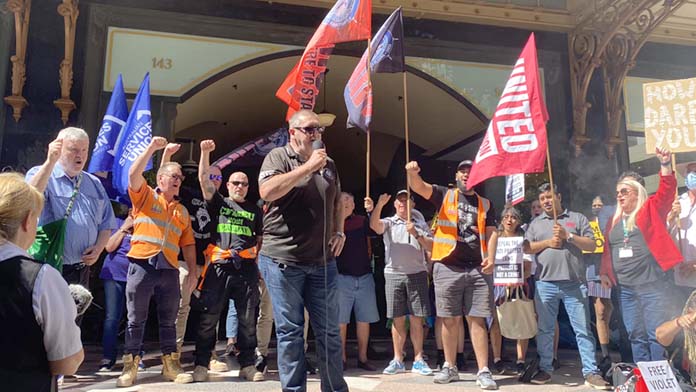The 15-month jail sentence handed to climate protester Violet Coco in Sydney in December has drawn outrage.
She became the first person jailed under new anti-protest laws in NSW introduced in April by Liberal Premier Dominic Perrottet—with the support of NSW Labor.
The laws threaten activists with fines of up to $22,000 and imprisonment of up to two years for blocking roads, rail lines, tunnels, bridges, or ports. Violet was sentenced for blocking traffic during a protest on the Sydney Harbour Bridge in April.
Following a storm of outrage, she was released on bail, but could go to jail again if she loses an appeal hearing on 15 March.
The last year has seen increasing repression of climate activists in NSW, Victoria and overseas.
In Victoria in May, the Andrews Labor government introduced changes to forest protesting laws, with fines of up to $21,000 or 12 months in jail and increased powers for authorised officers to search vehicles for so-called prohibited items.
In Britain, the Conservative government is giving police more powers to take action against climate protests before they even happen by broadening the definition of what counts as “serious disruption”.
The new law will target “guerrilla tactics” used by environmental protesters, such as walking slowly and bringing traffic to a standstill, and climbing freeway gantries.
These draconian restrictions on the right to protest have faced criticism from the climate movement, the union movement and civil society groups.
Outcry
Violet Coco’s sentencing sparked an outcry. More than 230 organisations signed a statement condemning the sentencing, including Unions NSW, Amnesty International, Oxfam, the Australian Conservation Foundation and the NSW Council for Civil Liberties.
A senior UN official weighed in on the issue, stating that he was “alarmed” at the sentencing and refusal to grant bail.
Rallies outside NSW Parliament and the Downing Centre brought hundreds onto the streets and once again united climate activists, trade unionists and supporters of civil society groups behind the demands to release Coco and repeal the anti-protest laws.
More than 100 activists took over the road and marched from parliament to the Downing Centre in defiance of the laws. Another rally at the Downing Centre on 13 December, coinciding with Coco’s bail hearing, was addressed by Unions NSW Assistant Secretary Thomas Costa and attended by union contingents from the CFMEU, ASU, MUA and UWU, as well as representatives from The Greens.
Following this rally, Coco was released after 11 days in jail under draconian bail conditions, including exclusion from Sydney unless for court.
More charges
More than a dozen other climate activists who were charged under the new anti-protest laws are awaiting their court dates and many could face jail. Some 21 activists were arrested in relation to the protests last June which saw Blockade Australia and supporters disrupt traffic in the CBD for two days.
Many of the activists who have been charged have also been under strict bail conditions since June, including extensive non-association orders that have made it effectively impossible for some organisations to mobilise.
The laws could become an issue in the March state election, given the role of both Liberal and Labor in rushing them through last year.
Following Coco’s sentencing, Dominic Perrottet reaffirmed his commitment to draconian restriction on the right to protest, describing it as “pleasing to see”.
Labor leader Chris Minns has said that he does not regret supporting the laws. Despite this support, some Labor members and MPs have expressed anger about the crackdown.
The response to Coco’s sentencing demonstrates both the need for and the possibility of a united fight against these laws.
There should be a demonstration outside Coco’s appeal hearing on 15 March, which will be an important opportunity to renew the demand to repeal the anti-protest laws going into the state election.
But a broader fight is needed. With major fossil fuel projects, including Santos’ Pilliga-Narrabri Gas Project, in the works across the country, mass civil disobedience will be needed. Unionists, civil society groups and the climate movement must come together to defend the right to protest—and use that right to win climate justice.
By Angus Dermody






